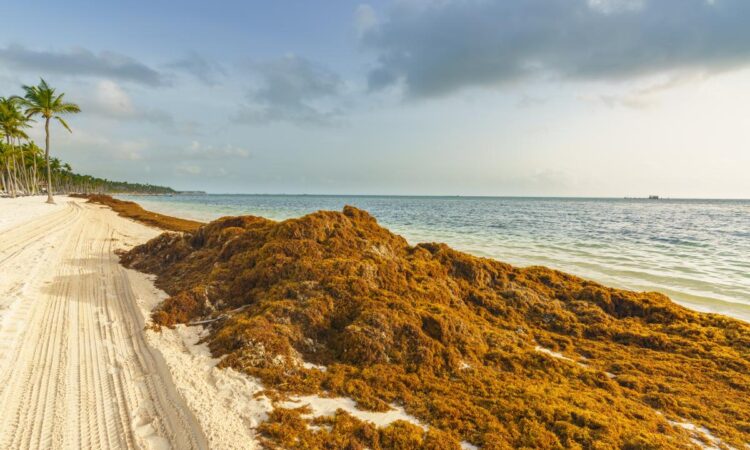EU joins forces with Latin America and Caribbean to combat sargassum and make it an economic opportunity under Global Gateway

Today at COP28, the EU and the Government of Dominican Republic co-organised the “COP 28 Sargassum Panel – Urgency and Opportunities for Action and Investment” at the Dominican Republic Pavilion. The Panel brought together the governments of the Barbados, Dominican Republic, Mexico, regional actors such as the Caribbean Community (CARICOM), the Central American Commission on Environment and Development (CCAD) and representatives from the private sector.
This forum follows both regions’ joint commitments at the EU-CELAC summit in July 2023, where, leaders pledged to work together to combat sargassum in the Caribbean. Under the EU-LAC Global Gateway Investment Agenda – the EU roadmap for potential investment projects to help address the region’s infrastructure needs – the EU launched “Turning sargassum into an economic opportunity”, a Team Europe Initiative that aims to reduce the damage caused by these algae and integrate them into the circular economy, where, for example, sargassum would be transformed into cosmetics, fertilizers, electricity and biomass. It also includes aspects related to monitoring, research and the mobilisation of resources to maximise impact for tackling and optimising both region’s joint approach.
The forum at COP28 contributed to consolidating understanding, review ongoing experiences and identify opportunities for future joint actions. Since the EU-Caribbean Sargassum conference in June 2023 in Santo Domingo, this follows close coordination between the EU, Caribbean and Latin American partners to combat the challenge of sargassum and make it an economic opportunity.
More than a decade has passed since the first mass strandings of sargassum in the Latin America and Caribbean region, countries are faced with exponentially increasing accumulations on their shores. The trend continues to impact key coastal ecosystems contributing to major negative economic, environmental and health impacts.
The panel, facilitated by EU programme Euroclima, complements the event “Combatting together the toxic effects of massive sargassum groundings in the Caribbean and beyond”, organised by France on December 2nd with the Vice-President of the Guadeloupe Region, and with the support of the Dominican Republic, Costa Rica, Mexico and the OECS, which promoted an international political initiative in the run-up to the United Nations Conference on the Oceans, due to be held in Nice in June 2025. The French government is a key Team Europe partner in the political discussions to building a collective and strategic approach to addressing sargassum.
Through the ongoing actions, and as part of Global Gateway, the European Union and the European Member States continue to demonstrate the readiness to support Caribbean efforts to tackle sargassum.
About the EU-LAC Global Gateway Investment Agenda
Global Gateway is the European strategy mobilising €300 billion by 2027 to develop smart, clean and secure links in the fields of digital, energy and transport, and to strengthen health, education and research systems in the whole world.
The European Union – Latin America and the Caribbean Global Gateway Investment Agenda has identified more than 130 potential investment opportunities to help address the region’s infrastructure needs, while creating local benefit and promoting growth, jobs and social cohesion. The EU-LAC Global Gateway Investment Agenda is a political commitment to work together, identifying fair green and digital investment opportunities in Latin America and the Caribbean, which will benefit from the open environment generated by trade and investment agreements and will help achieve the Sustainable Development Goals.
The Investment Agenda revolves around the following pillars
- a fair green transition
- an inclusive digital transformation
- human development
- health resilience and vaccines






